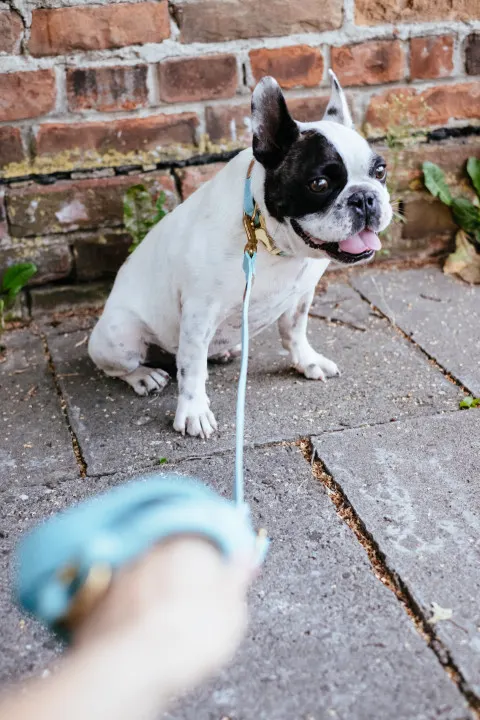French Bulldogs, or “Frenchies,” are great family dogs due to their gentle nature and calm temperament.
However, if you have an allergy sufferer in the family, no amount of good behavior from a French Bulldog can change that as you’ll need a hypoallergic dog. So, are French Bulldogs hypoallergenic?
No, French Bulldogs are not one of the hypoallergenic breeds. This breed tends to shed enough to trigger allergies in some individuals.
If you are only mildly allergic to pet dander, then a French Bulldog may still be a suitable breed for you as they don’t shed as much as other breeds.
If you’re thinking about getting a French Bulldog, but you’re unsure whether they’re the ideal pet for you due to your allergies, you’ll want to stick around for this article.
We will break everything down for you to decide whether this is an ideal breed for your family.
Do French Bulldogs Shed?
 French Bulldogs shed, as do all dogs. And yes, even the dogs labeled as ‘hypoallergenic’ shed, but not nearly as much as regular dogs.
French Bulldogs shed, as do all dogs. And yes, even the dogs labeled as ‘hypoallergenic’ shed, but not nearly as much as regular dogs.
Shedding is a natural event for dogs. It is their way of getting rid of damaged, old fur. However, the frequency at which they shed depends on the breed as well as the overall health of the canine.
Overall, Frenchies have a very short, thin fur coat that is easy to take care of. They don’t shed as much as other breeds, but they lose their undercoat in the spring and fall.
If you have a grooming mitt or stripping comb, you can help minimize the amount they shed, which will help with your allergies.
Can French Bulldogs Cause An Allergic Reaction?
 French Bulldogs can cause an allergic reaction; however, it’s unlikely, especially if your allergies to dogs are mild and not severe.
French Bulldogs can cause an allergic reaction; however, it’s unlikely, especially if your allergies to dogs are mild and not severe.
Since the coat on a Frenchie is smooth and very fine, they have less of a chance of having any pet dander on the hair they shed.
Therefore, French Bulldogs are less likely to trigger an allergic reaction unless you are highly allergic or super sensitive to the dander.
Are French Bulldogs Bad For Allergies?
Typically, Frenchies are not bad for allergies, but this depends on the individual. If someone is very allergic to dander or sensitive, then yes, a French Bulldog will be bad for your allergies.
On the other hand, if your allergy is mild, then the answer to this question is no, French Bulldogs are not bad for your allergies.
If you want a French Bulldog and you’re allergic, you can always ensure that you groom your dog every other day so that you can help release the dander from the skin, making it less likely that it will trigger an allergic reaction from you.
What To Do If You Experience Allergies
 First and foremost, if you develop swelling in the eyes, lips, or face, or you have a hard time breathing, then you need to call 911 immediately and get help.
First and foremost, if you develop swelling in the eyes, lips, or face, or you have a hard time breathing, then you need to call 911 immediately and get help.
If you do not have a severe reaction, we’ve included a list below of a few things you can do to reduce your allergy symptoms.
How To Reduce Pet Allergy Symptoms
There are a few extra steps you can take to reduce your pet allergy symptoms.
- Treat your symptoms. Before you ingest any type of medication, oral or topical, check with your doctor to make sure it’s safe for you. There are antihistamine pills and nose sprays you can get that will help stave off the annoying symptoms. Also, practicing good house cleaning and boosting your immune system can help.
- Bathe your dog often. Usually, you should bathe your dog at least once a week to clean off the dander. However, French Bulldogs should be washed no more than five times a year because their skin is sensitive. In this case, you’ll want to use waterless shampoos and other types of sensitive-skin-friendly products to rid of the dander.
- Designate an allergy-free zone. A great allergy-free zone would be your bedroom, as long as your dog doesn’t sleep with you. You can even put some HEPA air cleaners in the room to help.
- Filter your home’s air. Set up HEPA air cleaners in your home. Also, try to use furniture that doesn’t allow dander or dust to cling to it. Make sure you clean and dust frequently, including washing your sheets and pillows to minimize the amount of dander throughout your home.
What Causes French Bulldogs To Shed?

Shedding is a regular occurrence among all dogs, as it’s their body’s way of getting rid of old and damaged fur. This also occurs if your Frenchie gets too hot as it’s a way for its body to control its temperature.
While a little bit of shedding is entirely natural, there are reasons why your Frenchie might shed excessively. This can be caused by inadequate nutrition, medical issues, or skin allergies.
What Are The Signs Of Excessive Shedding In French Bulldogs?
If your French Bulldog seems to shed more than usual, you’ll want to check for these other signs:
- Scratching
- Sores
- Bald spots or thinning coat
- Irritation of their skin
- Dry hair
- Dull coat color
- Rubbing their face
If you discover your beloved dog doing any of those listed above, it’s best to get Fido to the vet to check for allergies and other medical issues.
Is There A Way To Stop A French Bulldog From Shedding?
 While shedding can be irritating in general to clean up, and of course, irritating to your allergies, there’s nothing out there that can stop your dog from shedding.
While shedding can be irritating in general to clean up, and of course, irritating to your allergies, there’s nothing out there that can stop your dog from shedding.
There are, however, some shampoos out there that can help get all the shedding out of the coat, but there’s nothing that’s going to stop it. Supplements, sprays, medications, and foods that claim to do so are putting that on their packaging simply for marketing tactics.
As long as you take care to groom your puppy every day and use a grooming mitt, that should be enough. Especially since this breed doesn’t shed as much, so the upkeep should be rather easy.
How To Tell If You’re Allergic To Your French Bulldog
Just because you grew up with a family dog and had no allergy issues doesn’t mean you can’t eventually develop an allergy to your beloved dog. Your allergy could have been there since childhood, but it didn’t show until recently.
Typically, with pet allergies, you will experience some symptoms. Below is a list that you can look over if you suspect allergies:
- Wheezing or shortness of breath
- Skin rashes or hives
- Tight chest
- Runny nose
- Itchy and watery eyes
- Cough
- Pain in your forehead or under your eyes due to sinus swelling. Also, this can appear in your temples or the top and back of your head.
The allergies are not always due to pet dander. As a matter of fact, most allergic reactions to pets are due to contact with their urine or saliva.
Ask Your Doctor To Test For Allergies
In today’s world, you’re able to test for allergies. You can see whether you’re allergic to your pet’s dander or saliva with an allergy test from your doctor.
It may be perfectly fine for you to sleep with your Frenchie, but it may not be okay for them to kiss you.
Keep Your Home Clean
If you decide to keep your French Bulldog, you can ensure that your house is spic and span to clean out the dander.
Vacuum your carpets frequently and then rinse out the vacuum canister. Also, wash your dog’s bed and clothing frequently in hot water.
Something else you’ll want to do is wash your lint screen in your dryer. A lot of the dander will be trapped here as your clothing and other things dry. Also, don’t forget to wash any fan blades as this will catch the dander and dust too.
Related Questions
 Why are French Bulldogs not hypoallergenic?
Why are French Bulldogs not hypoallergenic?
While French Bulldogs don’t shed nearly as much as other breeds, they still shed, and their hair still carries dander, making them a non-hypoallergenic breed.
If your allergies are only mild, then a French Bulldog would be acceptable to have since the dander is the main problem, not the actual hair itself. However, first, check to make sure you’re not allergic to urine or saliva.
Can you get over dog allergies?
The only way to eliminate a dog allergy is to avoid exposure to dogs. You can also look into allergy shots from your medical provider to dull down the reaction to dogs.
Overall, most people have a mild allergy which means you will be able to live with your dog and manage your allergy symptoms simultaneously.
Do pet allergies get worse over time?
Pet allergies can get worse over time, especially if the allergy is to cats. Talk to your doctor about any symptoms you’re experiencing, especially if your symptoms are worsening.
They can develop the best treatment for you and give you additional tips on living with your pets and controlling your allergies.
Heather is an animal lover that has many of them herself. She currently has her Blue Nose Staffy named Bootsie, but she’s catered to many animals over the years including guinea pigs, alpacas, cockatiels, cockatoos, bunnies, chinchillas, hedgehogs, and more. She believes that knowledge should be the foundation of caring for any pet.



Leave a comment
You must be logged in to post a comment.